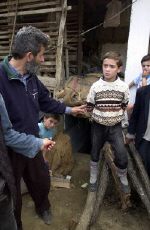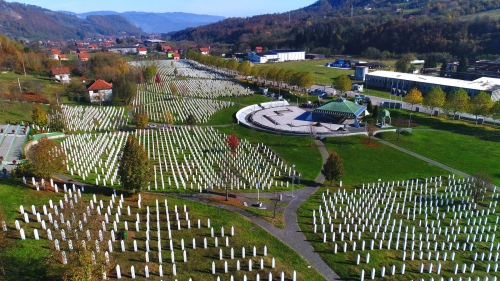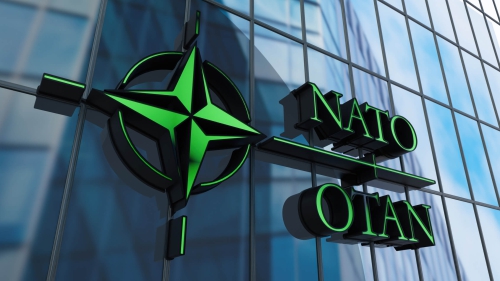Albanian Muslims Refuse to Give in Despite NATO and EU Support for Macedonia

The Imam of Slupcane, northern Macedonia, encourages children to get out from the basement where they took refuge 13 May 2001. Thousand of people took refuge in their houses's basements to avoid Macedonian bombings aimed at pushing back the UCK rebel forces. Macedonia's new government of national unity was to begin work 14 May battling to overcome deep divisions within its own ranks and to plot a course out of the most dangerous crisis in the republics history. |
The Albanian Muslims of Macedonia, who constitute more than a third of the country's population, are fighting for the constitutional rights enjoyed by the Slav majority but denied to them, and for autonomy only in the regions inhabited predominantly by them.
Although the religious, socio-economic and political discrimination traditionally inflicted on them began to increase a decade ago, the Albanians have taken to armed resistance only recently, following the rejection of proposals for a peaceful resolution of the conflict by the Slav-dominated coalition government in Skopje, the Macedonian capital. Even so, Albanian political parties have chosen to remain in the government and work for peace. Yet NATO and the European Union have seen fit to side with the Slavs against their Albanian victims, reassuring Skopje publicly of their support, and putting pressure on the Albanian members of the coalition government to oppose the National Liberation Army spearheading the Albanian Muslims' struggle for equal rights.
The support of western governments to Skopje is not confined to the economic and political fields but also extends to the military sphere. NATO and EU 'peace-keeping' forces monitor Macedonia's border with Bosnia and Albania, preventing any help from reaching NLA fighters, whose movement of men and arms they also severely curtail, while allowing government troops a free hand. NATO-led peace-keepers in Bosnia also block aid to the NLA. For instance they increased their presence on the border with Macedonia on June 6 to intercept fighters and supplies heading towards the conflict areas after the latest flare-up in the fighting, in which five soldiers had been killed and seven wounded.
| _________
The death-toll in the renewed fighting on June 5 was the highest among Macedonian forces since eight soldiers were killed in April, demonstrating that, despite NATO's and EU's political and military support for Skopje, the NLA is far from defeated. _________ |
The death-toll in the renewed fighting on June 5 was the highest among Macedonian forces since eight soldiers were killed in April, demonstrating that, despite NATO's and EU's political and military support for Skopje, the NLA is far from defeated. The soldiers were ambushed at Gajre village, near the city of Skopje. In the northeast of the country government troops have been shelling a series of villages, which they say are "occupied" by NLA fighters, daily for a whole month.
Prime minister Ljubco Georfievski, reacting strongly to the latest setback, called for a state of war to be declared against the fighters. His spokesman explained that "a strong response is the only way to achieve peace". But NLA leaders were not impressed by this threat. Musa Xhaferri, an NLA representative based in Switzerland, said in Brussels that there was "a de facto state of war already". And Ali Ahmeti, NLA leader, said on June 6 in a local newspaper interview that his movement would not be deterred. Insisting that the movement was only fighting for greater rights, he added: "We have tried to achieve our goal peacefully, but the government is only deceiving us and we remain second-class citizens."
Ali Ahmeti made his comments in the Albanian-language daily Flaka, and its readers are bound to agree with him. Most Albanians are shocked and angered by the daily shelling of the villages in the northeast, which has taken a heavy toll of civilian lives and property and displaced many people. Their shock and anger grew when a Slav mob went on the rampage in the southern city of Bitol, setting Albanian homes alight, on the pretext of reprisals for the NLA's alleged atrocities against Macedonians. Mob-attacks on Albanians are common and the police, far from stopping them, also carry out their own pogroms throughout the country, as a recent report by the New York-based Human Rights Watch shows.
The report, consisting of two documents, accuses government forces of beating and torturing Albanian civilians and looting and burning their homes. One document catalogues abuses by Macedonian police, charging them with "systematically separating out ethnic Albanian males" from among families fleeing the fighting, then taking them to police stations and torturing them. The other document describes the razing of Runica, an Albanian village of about 50 houses, meticulously burned to the ground by Macedonian forces on May 21. Even the city's mosque was not spared.
Yet the "first set-piece ministerial meeting between the EU and NATO", as one media report described the western foreign ministers' gathering at Budapest, Hungary, at the end of May, "assured the Macedonian government of support for its statehood and promised that no one expected it to treat with Albanian gunmen". At the same meeting, NATO's secretary-general, Lord Robertson, condemned the "thugs" fighting in the hills of northern Macedonia. A report in Newsweek (on June 11) commented that Lord Robertson was referring to NLA fighters "but he could have been talking of Macedonian government forces supported and advised by NATO and the EU" despite their record of abuses against Albanian civilians.
But western governments have expressed similarly blatant support for Skopje on other occasions. When, for instance, NLA representatives and the two Albanian parties in Macedonia's coalition government met in Kosova and agreed on a peace-plan on May 22, western governments were furious. They publicly condemned the agreement and the role that Robert Frowick (a US diplomat working for the Organisation for Security and Co-operation in Europe) played in arranging the meeting. Two days later the Macedonian government, clearly encouraged by the west's denouncement of the accord in Kosova, stepped up its offensive against the NLA.
But despite this support for Skopje, NATO and EU representatives claim that they are striving to establish peace in Macedonia and prevent war from breaking out again in the Balkans. That, they will continue playing this hypocritical 'peace' role and continue to s,upport Skopje is shown by Solana's journey to Macedonia to prevent the latest fighting from progressing to outright war. The purpose of his long meeting with the Albanian members of the coalition in Skopje is only too clear to need comment.
_________________________________________________
Crescent International is a newsmagazine of the global Islamic movement. You can visit their web site at muslimedia.com.

















